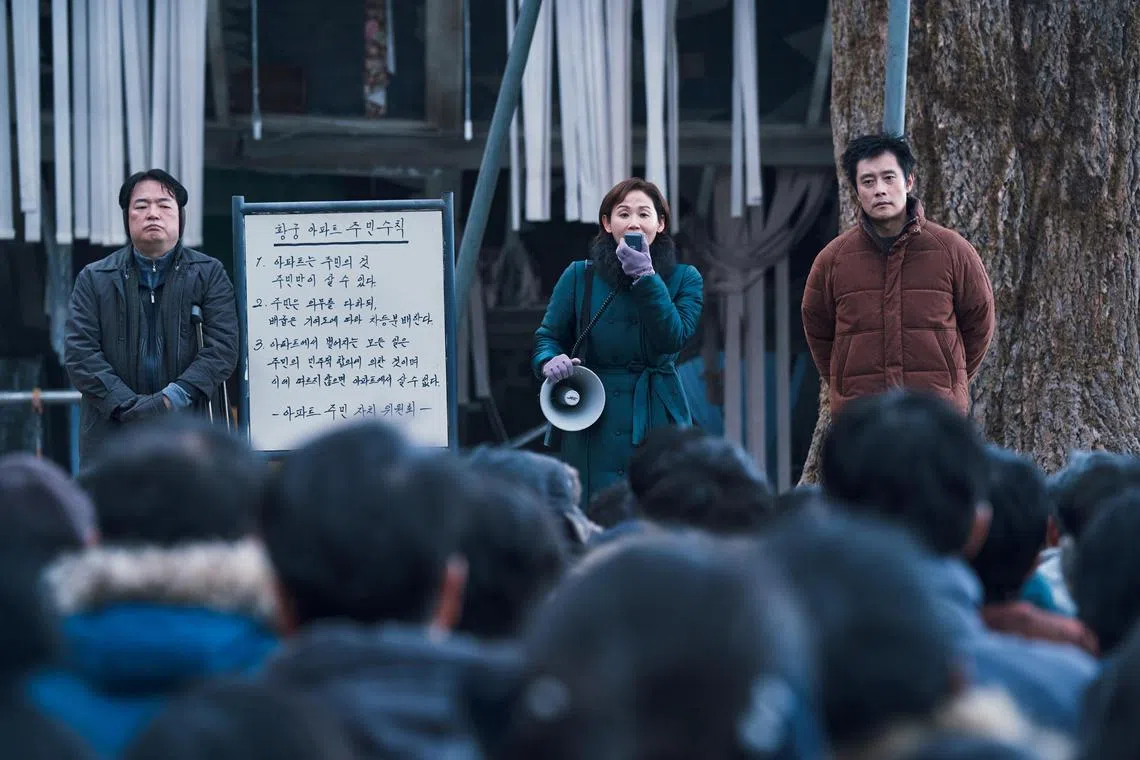At The Movies: In Concrete Utopia, an apartment block becomes a lifeboat in a sea of ruin
Sign up now: Get ST's newsletters delivered to your inbox

Lee Byung-hun (far right) creates a seemingly utopian society within an apartment building after a massive earthquake destroys Seoul.
PHOTO: GOLDEN VILLAGE PICTURES
Follow topic:
Concrete Utopia (PG13)
130 minutes, opens on Thursday
3 stars
The story: An earthquake has destroyed much of the planet. In a wintry Seoul, the Imperial Palace Apartments is the only structure left standing, giving its lucky residents shelter in a city overflowing with the homeless. Civil servant Min-seong (Park Seo-joon) and his wife, nurse Myeong-hwa (Park Bo-young), and other residents unite to protect their resources. In their midst is Yeong-tak (Lee Byung-hun), a resident with a mysterious past. Adapted from Kim Soong-nyung’s webtoon Pleasant Bullying.
In recent years, there has been a great run of movies that tackle social inequality. Bong Joon-ho’s Oscar-winning black comedy Parasite (2019) contrasted two families from opposite ends of the money spectrum, while Ruben Ostlund’s satire Triangle Of Sadness (2022), winner of the Palme d’Or, made a doomed yacht represent a world hopelessly split by race and caste.
In Concrete Utopia,
The quake that breaks the planet is shown, but only briefly. There is nothing in this movie that comes close to the extended action set pieces of a special effects spectacular such as, say, San Andreas (2015).
Instead, South Korean co-writer and director Um Tae-hwa puts the spotlight on the aftermath. Specifically, on the moral choices made by the block’s residents. South Korean star Lee’s enigmatic character of Yeong-tak becomes the focus of attention – he has something they need.
Amid strong performances all round, Lee is a fine actor who specialises in tight-lipped tough guys like Yeong-tak, Front Man in the award-winning series Squid Game (2021), and a dozen other similar roles in a long career.
But once his character moves from the periphery to the centre, the story switches tracks. What began as a sharp satire about apartment residents at their most monstrously Nimby-istic (not in my backyard) settles down into a passable mystery-drama, with Lee’s character at its centre.
The apocalypse is a big place and there is nothing wrong with extracting a crime thriller storyline, but it ought to have carried a sting in its tail potent enough to match the quality of the first two acts.
Hot take: Concrete Utopia unravels slightly at the end, but is mostly a darkly funny take on Nimby-ism as a force so powerful it will survive the ending of the world.


